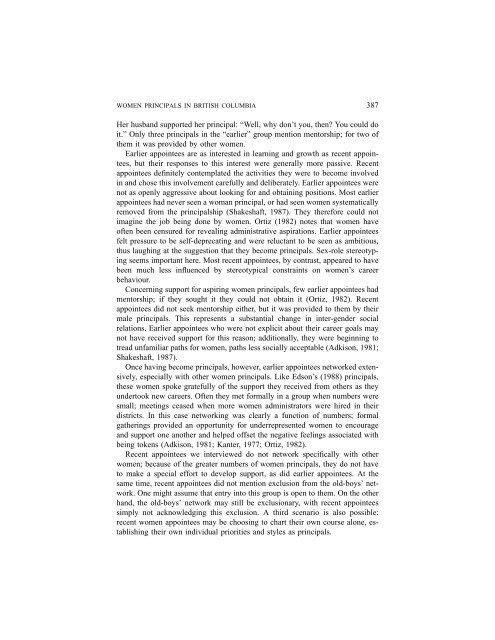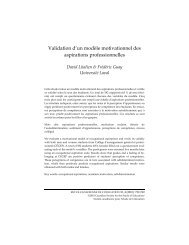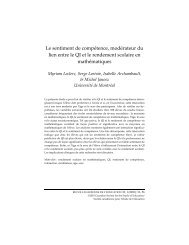Mireille Falardeau et Michel Loranger Le choix de stratégies ... - CSSE
Mireille Falardeau et Michel Loranger Le choix de stratégies ... - CSSE
Mireille Falardeau et Michel Loranger Le choix de stratégies ... - CSSE
You also want an ePaper? Increase the reach of your titles
YUMPU automatically turns print PDFs into web optimized ePapers that Google loves.
WOMEN PRINCIPALS IN BRITISH COLUMBIA 387<br />
Her husband supported her principal: “Well, why don’t you, then? You could do<br />
it.” Only three principals in the “earlier” group mention mentorship; for two of<br />
them it was provi<strong>de</strong>d by other women.<br />
Earlier appointees are as interested in learning and growth as recent appointees,<br />
but their responses to this interest were generally more passive. Recent<br />
appointees <strong>de</strong>finitely contemplated the activities they were to become involved<br />
in and chose this involvement carefully and <strong>de</strong>liberately. Earlier appointees were<br />
not as openly aggressive about looking for and obtaining positions. Most earlier<br />
appointees had never seen a woman principal, or had seen women systematically<br />
removed from the principalship (Shakeshaft, 1987). They therefore could not<br />
imagine the job being done by women. Ortiz (1982) notes that women have<br />
often been censured for revealing administrative aspirations. Earlier appointees<br />
felt pressure to be self-<strong>de</strong>precating and were reluctant to be seen as ambitious,<br />
thus laughing at the suggestion that they become principals. Sex-role stereotyping<br />
seems important here. Most recent appointees, by contrast, appeared to have<br />
been much less influenced by stereotypical constraints on women’s career<br />
behaviour.<br />
Concerning support for aspiring women principals, few earlier appointees had<br />
mentorship; if they sought it they could not obtain it (Ortiz, 1982). Recent<br />
appointees did not seek mentorship either, but it was provi<strong>de</strong>d to them by their<br />
male principals. This represents a substantial change in inter-gen<strong>de</strong>r social<br />
relations. Earlier appointees who were not explicit about their career goals may<br />
not have received support for this reason; additionally, they were beginning to<br />
tread unfamiliar paths for women, paths less socially acceptable (Adkison, 1981;<br />
Shakeshaft, 1987).<br />
Once having become principals, however, earlier appointees n<strong>et</strong>worked extensively,<br />
especially with other women principals. Like Edson’s (1988) principals,<br />
these women spoke gratefully of the support they received from others as they<br />
un<strong>de</strong>rtook new careers. Often they m<strong>et</strong> formally in a group when numbers were<br />
small; me<strong>et</strong>ings ceased when more women administrators were hired in their<br />
districts. In this case n<strong>et</strong>working was clearly a function of numbers; formal<br />
gatherings provi<strong>de</strong>d an opportunity for un<strong>de</strong>rrepresented women to encourage<br />
and support one another and helped offs<strong>et</strong> the negative feelings associated with<br />
being tokens (Adkison, 1981; Kanter, 1977; Ortiz, 1982).<br />
Recent appointees we interviewed do not n<strong>et</strong>work specifically with other<br />
women; because of the greater numbers of women principals, they do not have<br />
to make a special effort to <strong>de</strong>velop support, as did earlier appointees. At the<br />
same time, recent appointees did not mention exclusion from the old-boys’ n<strong>et</strong>work.<br />
One might assume that entry into this group is open to them. On the other<br />
hand, the old-boys’ n<strong>et</strong>work may still be exclusionary, with recent appointees<br />
simply not acknowledging this exclusion. A third scenario is also possible:<br />
recent women appointees may be choosing to chart their own course alone, establishing<br />
their own individual priorities and styles as principals.








